All Out to Support the People of Honduras
• U.S. Must Break Ties and Funding to Coup Leaders Now!
•
Resistance to Honduras Coup Continues
• Oppose Any Attempt to Legitimate the Coup!
• Latin America Scholars Say Anything Less Than Urgent Restoration of Zelaya to Office Would Usurp the Will of the Honduran People
• Reflections by Comrade Fidel: The Coup Dies or Constitutions Die
•
Honduras and the "Twin-Track" Policy of the United States The Role of the International Republican Institute (IRI) in the Honduran Coup
For Your Information
•
Message from President Zelaya to the Honduran People,
• Remarks by Secretary of State Hillary Clinton on Meeting with President Zelaya of Honduras,
U.S. Must Break Ties and Funding to Coup Leaders Now
All Out to Support the People of Honduras
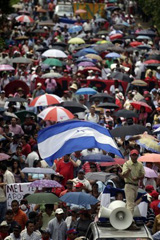
![]()
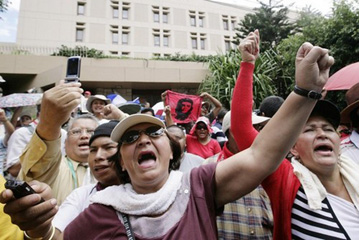
Tegucigalpa, Honduras, July 7 & 8, 2009: Demonstration July 8 in front of U.S. Embassy (right) demanding President Zelaya be returned to power. Mass actions are continuing daily through out Honduras
Voice of Revolution salutes the resistance of the people in Honduras against the coup d’etat that removed their President Manual Zelaya from power. Demonstrations have continued every day since the coup occurred June 28. This includes demonstrations by workers, farmers, youth, indigenous organizations and many more, as well as strike actions.
The firm demand of the Honduran people and those worldwide is that President Zelaya must be returned to power and constitutional order restored. Hondurans have said they will not negotiate on this demand, as to do so is to negotiate democracy. Voice of Revolution calls on the U.S. government to demand that the coup leaders immediately step down without conditions or negotiations. The U.S. must act to assist President Zelaya's return to power to complete his term. This is non-negotiable and necessary for constitutional order to be restored. For the U.S. to insist on negotiations with the coup leaders concerning Zelaya’s return is to insist on giving them legitimacy and time to carry out further repression. Zelaya must be returned to power now and the U.S. must break all ties and funding to the coup leaders.
Coup Government Blocks Democracy
The Organization of American States (OAS) demanded that the coup organizers step down and restore Zelaya to power by July 4. They refused. When Zelaya attempted to return to Honduras July 5 – accompanied by President of the United Nations General Assembly Miguel D’Escoto, Honduran ambassador to the Organization of American States (OAS) Carlos Sosa and Honduran Foreign Minister Patricia Rodas – the coup organizers blocked the airport runways using military vehicles. Zelaya’s plane came in low in three daring efforts to land but was unable to do. He instead flew to Nicaragua.
The more than one hundred thousand people who came to greet Zelaya at the airport faced violent repression by the coup government, with two people killed, including a young boy. The U.S. government did not condemn this repression, just as it remained silent concerning the actions of the coup government to suspend constitutional rights, detain journalists and prevent media outlets from broadcasting. The coup government imposed a 6pm-6am curfew and detained and persecuted members of Zelaya’s cabinet and family. While the U.S. has said it supports the return to power of Zelaya, it has acted to give legitimacy to the coup government and keep it in power. An estimated $180 million in aid is still be sent and the criminal coup leaders were allowed to come to the U.S. and speak to Congressmen.
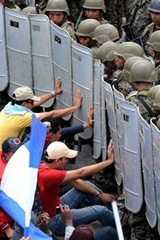
![]()
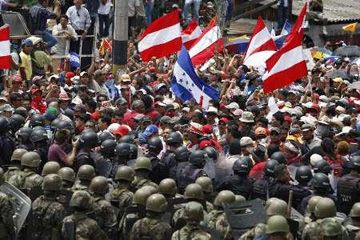
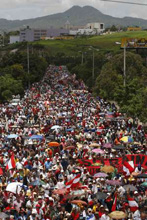
![]()
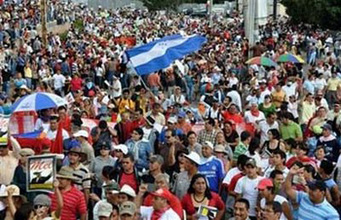
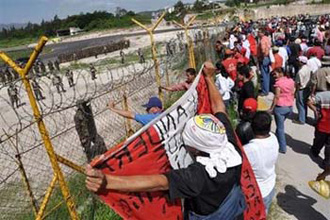
![]()
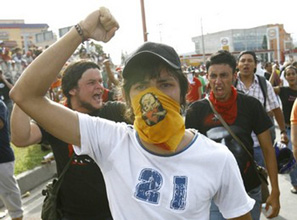
President Obama’s national Security Advisor Jim Jones was in direct contact with the Honduran military before, during and after the coup, as were other U.S. officials. The U.S. military base in Honduras is acting to assist the coup leaders. It is well-known that the base has been used against the peoples of Central and latin America and is armed and prepared to do so again. The Honduras coup d'etat could be the beginning of more. From the beginning the Obama administration clearly did not state that if the coup was carried out, the U.S. would break all ties with such an illegal and undemocratic government. It has not broken ties to date, despite the military brutality against demonstrators, despite the coup government’s refusal to submit to the OAS demand and despite the refusal to allow Zelaya to return.
By its silence and actions, the U.S. is continuing to back the wealthy elite of Honduras and their military dictate, while attempting to appear to oppose the coup. The U.S. is showing that it is not happy with the way the military usurped power in Honduras, but not that it has power. Hence, the continued contact and support for the coup government and the demands on President Zelaya to negotiate with it.
These demands were made when President Zelaya met with Secretary of State Hillary Clinton July 7. Zelaya made clear that his return to power is not negotiable but that he would participate in efforts to peacefully resolve the current situation. In her press statement following the meeting, Clinton did not call for Zelaya to be restored to power as the step required to restore democracy and constitutional order. Instead she presented the situation as though both sides are wrong. She said, “I reiterated to [Zelaya] that the United States supports the restoration of the democratic constitutional order in Honduras. We continue to support regional efforts through the OAS to bring about a peaceful resolution that is consistent with the terms of the Inter-American Democratic Charter.” She did not condemn the coup government’s violence against demonstrators, limiting herself to conveying “our deep regret over the tragic events that unfolded in the last days.” She then said, “We call upon all parties to refrain from acts of violence and to seek a peaceful, constitutional, and lasting solution to the serious divisions in Honduras through dialogue.”
It is the coup leaders who have used military violence against the people and against President Zelaya. U.S. backing for military coup d’etats have no place and stand completely against democracy and constitutional order. Now is the time to break all ties with the illegitimate and repressive coup government! Obama must act now.
We demand that President Zelaya be restored to power as the first requirement of restoring democracy and constitutional order. Zelaya is the elected president, recognized by governments worldwide, by the UN, the OAS, the Rio Group and more. Prior to the coup, he was organizing to have a non-binding referendum placed on the November ballot, asking the people if they want to have a constituent assembly convened to write a new constitution. While U.S. monopoly media have repeatedly claimed Zelaya’s only purpose was to extend his term in office, in fact he was attempting to provide the people with an opportunity to express their opinion, and, if they so chose, to vote in a referendum in November on establishing a constituent assembly. Both the opinion poll and a November referendum provide the opportunity to increase democracy by increasing the role of the people in it.
The coup was organized to block this direction and even the minimal step of a non-binding referendum. By refusing to insist the coup government step down now, the U.S. government is backing this attack on democracy. We say NO! All out to support the people of Honduras!
Salute Resistance in Honduras!
Restore President Zelaya to Power!
Break Ties and Funding to the Coup Government!
[TOP]
National Resistance Front Says Do Not Negotiate Democracy
Resistance to Honduras Coup Continues
Resistance to the military coup d’etat June 28 in Honduras has continued non-stop. Despite a curfew and military repression, demonstrations have been organized across the country, with highways and bridges being blocked and workers and teachers on strike. On July 8 people set up roadblocks on the International Highway to Nicaragua to strike a blow against the wealthy elite of Honduras that supports the coup. Demonstrators walked along highways through out the country chanting, “Forward, forward, the struggle is constant!” and “We want Mel,” the nickname of constitutional President Manuel Zelaya. Demonstrations have continued daily with the united demand that President Zelaya be restored to office and constitutional order be restored. The military and coup leaders have been condemned for acting against that constitutional order, using military force to kidnap and remove Zelaya and suspend constitutional rights.
Demonstrations were organized Sunday, July 6 in Tegucigalpa, the capital, to greet Zelaya as he attempted to return home. However, the illegal coup government refused to allow him to land, blocking the airport landing strips with military vehicles. According to press reports, military repression against the more than 120,000 people near the airport awaiting President Zelaya left two people dead – including a young boy – and hundreds wounded.
While the U.S. government did not denounce this repression nor break ties with the coup government given its anti-democratic actions, Secretary of State Clinton did meet with President Zelaya. She called on him to negotiate with the unconstitutional coup government that usurped power through a military coup d’etat. These negotiations were organized in Costa Rico, where president of Costa Rico, Oscar Arias met separately with Zelaya, and with coup leader Roberto Micheletti.
President Zelaya made clear to Clinton that his return to power as elected President is not negotiable. He did agree to discuss what is necessary to bring his return about in a peaceful manner. He reiterated that reiterated that he would not negotiate on his return, saying to do so would be like accepting conditions from a criminal that raped your family.
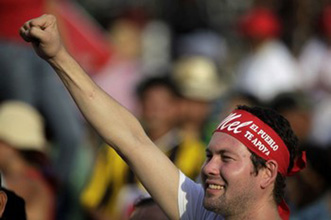
![]()
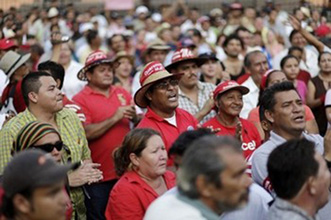
Mass actions in Pedro San Sula, July 8
The many social and political organizations of the National Resistance Front in Honduras issued their statement saying that the return of President Zelaya to power is the requirement of democracy in Honduras at this time and they would not negotiate on democracy. The Front said “the unconditional restitution of the constitutional president of the Republic, Manuel Zelaya, with the purpose of concluding the term in office to which he was elected,” was not negotiable. His return is necessary for a return to constitutional order in Honduras and the military must submit to this order, the statement said. The Front emphasized that the return of Zelaya does not require negotiations or conditions but rather that the coup government immediately step down.
The Front’s statement also defended the right of the people to demonstrate against the coup and denounced the violent repression of the coup government. It said, “due to the situation presented by the coup d’état devised and carried out by the Honduran political, religious and military oligarchy, the people have acted in legitimate defense of the right to participation, continuing in a peaceful and popular insurrection before the dictatorial government.” Demonstrations and blocking of roads and bridges are continuing.
Thursday, July 9 marked the 12th consecutive day of the Honduran people's resistance to the military coup. The people are steadfast in their demand that actions will continue until President Manuel Zelaya is returned to office. The popular anti-coup movement is growing every day, said Ismael Salinas, one of the leaders of the resistance. "Hondurans are joining the struggle, which won't stop until Manuel Zelaya returns to the presidency," he told Prensa Latina during a July 8 rally.
Salinas is a general secretary of the Unitary Federation of Honduran Workers (FUTH), one of the three trade unions that form the National Front against the coup d'etat. The Front is also comprised of rural, student, youth, human rights, environmental, women's and social organizations.
Journalist Eva Golinger writes that actions on July 8 included "shutting down major roadways, striking and maintaining a popular resistance front to keep people unified against the coup government. There are reports of more than 600 detentions by the armed forces of Zelaya supporters." Rallies took place in the capital's eastern sector and the road joining the city with the country's eastern zone, mainly Olancho and Paraiso departments, Prensa Latina reports.
In related news, after having been pursued along with her family, the First Lady of Honduras, Xiomara Castro de Zelaya, on July 6 headed a mass march in Tegucigalpa for democracy, against the coup d'etat and for the restoration of Honduras' constitutional president Manuel Zelaya. Addressing the rally, Castro affirmed her solidarity with the Honduran people and the families of the victims of the dictatorial coup regime, while calling on the people to go on fighting and not to be afraid, "because what we are doing is right."
[TOP]
Mediation Talks Underway in Costa Rica
Oppose Any Attempt to Legitimate the Coup!
While President Obama has generally maintained a distance from efforts to restore Honduran President Manuel Zelaya to power, Secretary of State Hillary Clinton, and various forces with ties to the Clintons have been actively pushing that Zelaya negotiate with the coup leaders. Mediation talks are currently underway in Costa Rica where Costa Rican President Oscar Arias has taken on the role of mediating President Zelaya's return to Honduras. Numerous proposals for "compromise" are being floated by the U.S. and coup leaders, such as the holding of early elections. Zelaya's term ends in November, when new elections are scheduled.
The U.S. push for negotiations, rather than breaking with the illegitimate coup government, and the various proposals are all serving to legitimize the coup and make it appear that they have as much right to power as Zelaya. By doing so the government is giving the coup leaders authority they otherwise would not have and also time to strengthen their power within the country. President Zelaya has rightly denounced any conditions or negotiations on his return to power.
Journalist Eva Golinger on July 9 reported: "President Manuel Zelaya of Honduras, ousted in the military coup on Sunday, June 28, was in Costa Rica today for meetings with Costa Rican president Oscar Arias, who was selected by the U.S. State Department (handpicked by Secretary of State Hillary Clinton) to 'mediate' the conflict in Honduras. Coup leader Roberto Micheletti also flew in from Honduras and attended a separate meeting with President Arias, after President Zelaya met with Arias in the presidential residence in San José.
"President Zelaya was clear that the only 'negotiation' he would engage in regarded how the coup leaders would step down and either leave the country or submit to some form of justice. Meanwhile, coup leader and dictator Micheletti was also holding his own, stating he would negotiate all matters except for President Zelaya returning to power.
"So things are pretty much where they were 12 days ago. [...]"
Going into the talks, President Zelaya said that he had two specific aims in mind.
"What is going to be done is to fulfill the resolution of the Organization of American States and the resolution of the United Nations, in which they ask first and foremost for the reinstatement of the president of the republic. Number two is the complete non-recognition of the authorities by coup d'etat, and condemnation of the coup d'etat," he said.
"There are things that are non-negotiable such as the reestablishment of democracy and my return to my post. The restoration of the government is not up for discussion, as I will not betray the people who took to the streets," he affirmed.
"If presidents are going to be appointed by the military and politicians by using illegitimate authority, we will be moving back some 100 years. We can not return to those times in which the presidents had to sleep in their suits and with their suitcases packed, since they could be expelled or killed at any moment," he stated.
"We are neither betraying nor leaving our people alone, on the contrary; we are empowering our people because all countries of the world, without exception, are supporting this process of legal and juridical reinstatement."
Several Costa Rican organizations repudiated the presence of Roberto Micheletti in their country. Sonia Soliz, from the Frente Amplio organization, said that Micheletti "is a dictator and in this country the people do not welcome him," Prensa Latina reported. On July 9 many social and political organizations in Costa Rica demonstrated in front of the Honduran Embassy to show their support for Honduran President Manuel Zelaya. An activist in Costa Rico reports, “We have been very active. The first day of the coup, we were at the Honduran Embassy showing our rejection of Micheletti.” He added, “We reject the coup, the violence against the Honduran people, and the very well orchestrated media blockade. He said many organizations “will gather to support President Zelaya. Our intention is to send a message to President Arias that we want a negotiation based on the return of President Zelaya to Honduras.”
Meanwhile, some of the Honduran putschists were in Washington, DC on July 7 to meet with U.S. politicians on a visit organized by Republican Senator John McCain, news agencies report. Granma Daily reported that McCain, former U.S. presidential candidate, known for his hostile and interventionist positions against Venezuela, Bolivia and other countries in the region who reject U.S. interference in their affairs, sponsored a press conference with the coup plotters at the National Press Club in Washington. The delegation, composed of members of Honduras' Congress, representatives of the private sector and ex-members of the judiciary, has the objective of justifying the coup d'etat in that central American country.
A report by the Spanish news agency EFE confirmed the presence of members of the pro-coup faction in Washington and their press conference, in which Roberto Flores, former Honduran ambassador to the United States, called the coup against Manuel Zelaya a "constitutional solution." Flores explained that the commission would be in the U.S. capital until July 10 and would meet legislators like Democratic leader Eliot Engel, Republican Congressman Lincoln Diaz Balart and Democratic Congresswoman Gabrielle Gifford.
John McCain is the head of a board of directors of the International Republican Institute (IRI), an entity considered the international force of the U.S. Republican Party which was instrumental in the coup against Venezuelan President Hugo Chavez in 2002. In the past year, the IRI has operated in Honduras with funds of more than $1.2 million provided by the National Foundation for Democracy, to influence political parties and "support initiatives to implement political stances during the 2009 campaigns."
Notably, while the U.S. announced on July 8 that it was suspending $16.5 million in military and development aid to Honduras, it would be continuing "programs that directly benefit the Honduran people" including "assistance to facilitate free and fair elections."
(Prensa Latina, Agencia Cubana de Noticias, Al Jazeera, New York Times, www.ChavezCode.com)
[TOP]
Open Letter Calls on Clinton to Oppose Early Elections
Latin America Scholars Say Anything Less Than Urgent Restoration of Zelaya to Office Would Usurp the Will of the Honduran People
More than 35 scholars and experts on Latin America sent an open letter to Secretary of State Hillary Clinton today urging against the idea of early elections in Honduras as a possible resolution to the current crisis resulting from the June 28 military coup d'etat. Stating that "Anything less than the urgent restoration of President Manuel Zelaya to office would be a usurpation of the will of the Honduran people," the signers urged Clinton to enact forceful sanctions on the coup regime to ensure Zelaya's prompt reinstatement. The signers include Harvard emeritus professor John Womack; scholar, author, commentator, and filmmaker Saul Landau; Central America expert Hector Perla, and authors and Central America experts Greg Grandin and Dana Frank, among others.
"It is supremely important that we not make any concessions to those who have perpetrated military coups. By doing so, we establish a dangerous precedent," said Dana Frank, Honduras expert and professor of history at University of California, Santa Cruz.
The letter also notes that the coup regime has suspended civil liberties, thus eliminating conditions under which free and fair elections could take place in the near future. The signers also debunk the pretext for the coup — Zelaya's supposed plans for reelection — by pointing out that it would be almost impossible for Zelaya to be reelected before his successor assumes office next year, and that Zelaya stated before June 28 that he did not seek reelection.
For more information contact: Contact: Hector Perla, 310-985-1673; Dana Frank, 831-600-5525; Suyapa Portillo Villeda, 626-403-0514; Forrest Hylton, 347-742-4401
Full Text of the Letter
July 9, 2009
The Honorable Hillary Rodham Clinton
Secretary of State
2201 C Street NW
Washington, DC 20520
Dear Secretary Clinton,
We, the undersigned, are concerned by proposals by some in Washington's foreign policy circles to push for early elections as a solution to the crisis instigated by the illegal and anti-democratic coup d'etat in Honduras. Anything less than the urgent restoration of President Manuel Zelaya to office would be a usurpation of the will of the Honduran people. Following resolutions by the United Nations General Assembly and the Organization of American States calling for Zelaya's immediate and unconditional return to office, the U.S. must ensure his prompt restoration by enacting forceful economic sanctions against the regime.
Each day that the illegal coup regime remains in office further jeopardizes the capacity for Honduras to enjoy free and fair elections in November, let alone in an earlier time frame. Elections currently would take place under a coup regime that has suspended civil liberties, and where the conditions for free elections do not exist. Such an election would not have international legitimacy. Democracy has to be restored before a legitimate election can take place. It is also important to avoid making concessions of any kind to the coup government, as it would create a terrible precedent, showing other anti-democratically minded and power hungry individuals that it can be worthwhile to carry out a military coup in order to advance their political agendas.
Since illegally seizing office by abducting the president at gunpoint and putting him on a plane to Costa Rica, the coup regime has suspended civil liberties and treated the Honduran people as the enemy. They have revoked freedom of the press by imposing a media blackout, assaulted and detained journalists, clamped down on protests, detained hundreds of supporters of President Zelaya, and killed at least two people by firing on demonstrators.
The regime claims it acted in order to prevent an unconstitutional move by President Zelaya to extend his term. Yet an examination of the facts reveals this to be a dubious excuse for an assault on democratic institutions and the rule of law. President Zelaya's proposed survey would have been a non-binding poll of public support for an additional ballot — on whether a constitutional assembly should be created — in the November elections. The actual question read: "Do you agree that, during the general elections of November 2009 there should be a fourth ballot to decide whether to hold a Constituent National Assembly that will approve a new political constitution?"
Zelaya was not running for reelection in November, nor would he have been able to. Therefore, Zelaya's successor was always slated to be elected in November, to be inaugurated in January. Zelaya had also stated before June 28 that he did not desire reelection. Possible reelection was not the reason the military carried out the coup. They opposed Zelaya's policies, and they have at times been honest about their true motives: "It would be difficult for us, with our training, to have a relationship with a leftist government," Honduran army attorney Colonel Herberth Bayardo Inestroza explained following the coup. "That is impossible."
There is one legal, just, and democratic solution to Honduras' current crisis: the swift restoration of President Zelaya and the imposition of economic sanctions on trade as well as aid, on the illegal regime. We call on the U.S. to take the lead in ensuring this outcome.
Sincerely,
Marc Becker, Associate Professor of Latin American History, Truman State University*
Blase Bonpane, Director, Office of the Americas
Michael Brun, PhD, Dept. Economics, Illinois State University
Ron Chilcote, Professor Economics, University of California (UC) Riverside
Aviva Chomsky, Professor of History and Coordinator, Latin American Studies, Salem State College
Noam Chomsky, Professor of Linguistics, Massachusetts Institute of Technology
Jaime Concha, Professor of Latin American Literature, UC, San Diego
Luis Duno Gottberg, Associate Professor, Hispanic Languages and Literature, Rice University, Houston, Texas
Steve Ellner, Professor Political Science, University of Oriente, Venezuela
Professor Raul Fernandez, Social Sciences, UC Irvine
Dana Frank, Professor of History, UC, Santa Cruz
James Goldfarb, Devine Professor of Economics, Loyola Marymount University
Greg Grandin, Professor of History, Director of Graduate Studies, New York University
Mark Healey, Assistant Professor of History, UC, Berkeley
Daniel Hellinger, Professor of Political Science, Webster University
Forrest Hylton, Assistant Professor of Political Science/Int'l. Relations, Universidad de los Andes (Colombia)
Misha Kokotovic, Associate Professor, Department of Literature UC San Diego
Saul Landau, Professor Emeritus, California State University, Pomona
Jorge Mariscal Director, Chicano/a-Latino/a Studies, UC, San Diego
Luis Martín-Cabrera, Assistant Professor of Literature, UC, San Diego
Gilda L. Ochoa, Associate Professor of Sociology and Chicana/o - Latina/o Studies, Pomona College
Tanalis Padilla, Associate Professor of History, Dartmouth College
Diana Paton, Reader in Caribbean History, Newcastle University, Britain
Hector Perla, Assistant Professor, Latin American and Latino Studies, UC, Santa Cruz
Deborah Poole Professor, Anthropology, Johns Hopkins University
Suyapa G. Portillo Villeda, CFD Fellow, History Department, Pomona College
Gerardo Renique, Associate Professor, Department of History City College of the City University of New York
William I. Robinson, Professor of Sociology and Global and International Studies, UC, Santa Barbara
Dr. Victor M. Rodriguez Professor, Department of Chicano and Latino Studies, California State University, Long Beach
Dr. T.M. Scruggs, School of Music, University of Iowa
Victor Silverman, Department of History, Pomona College
Steve Striffler, Doris Zemurray Stone Chair in Latin American Studies, Professor of Anthropology, University of New Orleans
Christy Thornton, Director and Publisher, North American Congress on Latin America
Miguel Tinker Salas, Professor of History, Pomona College
Mark Weisbrot, Co-Director Center for Economic and Policy Research
John Womack Jr., Professor of History, Emeritus Harvard University
Stephen Zunes, University of San Francisco
*Institutional affiliations are listed for identification purposes only.
[TOP]
The Coup Dies or Constitutions Die
The countries of Latin America were struggling against history’s worst financial crisis within relative institutional order. When U.S. President Barack Obama — while on a trip to Moscow to discuss vital topics on the subject of nuclear weapons — was declaring that the only constitutional president of Honduras was Manuel Zelaya, the ultra right-wing and the hawks in Washington were making maneuvers for Zelaya to negotiate a humiliating pardon for the illegalities attributed to him by the perpetrators of the coup.
It was obvious that before his people and the world such an act would be tantamount to his disappearance from the political stage. It is a proven fact that when Zelaya announced he would be returning on July 5, he had decided to fulfill his promise to share the brutal repression of the coup with his people.
Traveling with the president was Miguel d’Escoto, the president pro tempore of the United Nations General Assembly, along with Patricia Rodas, the Honduran foreign minister, a Telesur journalist and others, a total of 9 persons. Zelaya maintained his decision to land. I know for a fact that in mid-flight, when they were nearing Tegucigalpa, he was informed from the ground about Telesur’s live broadcast of the enormous mass of people awaiting him outside the airport and the attack by soldiers using tear gas and automatic rifles.
His immediate reaction was to request that they go to a higher altitude in order to denounce the events on Telesur and to demand that the commanding officers of those troops stop the repression. Then he informed them that he would carry on with the landing. The coup leaders’ high command then ordered the landing strip to be blocked. In a matter of seconds, motorized transport vehicles were obstructing the runway.
The Falcon jet made three passes, at a low altitude, over the airport. Specialists explain that the tensest and most dangerous moment for pilots is when fast, small planes — like the one carrying the president — reduce speed for touchdown. That is why I think that attempt to return to Honduras was audacious and brave.
If they wanted to put him on trial for alleged constitutional crimes, why not allow him to land? Zelaya knows that it was not only the Constitution of Honduras what was at stake, but also the right of the peoples of Latin America to elect the people who govern them.
Today Honduras is not just a country occupied by a coup, but it is also a country occupied by the armed forces of the United States.
The military base at Soto Cano, also known by its name of Palmerola — located less than 100 kilometers [about 60 miles] from Tegucigalpa and reactivated in 1981 under the Ronald Reagan administration — was used by Colonel Oliver North when he was running the dirty war against Nicaragua, and from there the U.S. government directed the attacks against the Salvadoran and Guatemalan revolutionaries that cost tens of thousands of lives.
That is the location of the U.S. Joint Task Force-Bravo — made up of personnel from the three forces — that occupies 85 percent of the area of the base. Eva Golinger reveals its role in an article published on the Rebelión web site on July 2, 2009, entitled “The US Military Base in Honduras at the Center of the Coup.” She explains that “the Constitution of Honduras does not legally allow for a foreign military presence in the country. A ‘handshake-like’ agreement between Washington and Honduras authorizes the important and strategic presence of hundreds of U.S. soldiers on the base, under a ‘semi-permanent’ deal. The agreement was reached in 1954 as part of the military aid the United States was offering Honduras…the third poorest country in the hemisphere.” She adds that “…the agreement that allows the military presence of the United States in the Central American country can be removed with no notice given.” Soto Cano is also home of the Aviation Academy of Honduras. The components of the U.S. military task force are partly made up of Honduran soldiers.
What is the objective of the military base, the planes, the helicopters and the U.S. task force in Honduras? Without any doubt their only purpose is for use in Central America. The war on drug trafficking does not require those weapons.
If President Zelaya is not returned to his position, a wave of coups threatens to sweep away many Latin American governments, or these will be at the mercy of the ultra right-wing military, educated in the security doctrine of the School of the Americas, an expert in torture, psychological warfare and terror. The authority of many civilian governments in Central and South America will become weakened. Those dark days are not very far back in time. The military perpetrators of the coup would not even pay any attention to the civilian administration of the United States. It can be very negative for a president who wants to improve that country’s image, like Barack Obama does. The Pentagon formally obeys the civilian power. The legions have not yet taken over control of the empire as they did in Rome.
It would not be understandable for Zelaya to now admit to stalling maneuvers that would wear out the considerable social forces that support him and only lead to an irreparable attrition.
The illegally overthrown president does not seek power, but he defends a principle, and as Marti said: “One just principle from the depths of a cave can be mightier than an army.”
Fidel Castro Ruz, July 10, 2009
[TOP]
Honduras and the "Twin-Track" Policy
of the United States
Until Honduran President Manuel Zelaya is returned to Tegucigalpa with all of the powers established in that Central American nation's Constitution, we must be wary of the "twin-track" policy. There is too much experience in "Our America" of clever "diplomatic" moves by the White House and the ability of its intelligence agencies to generate confusion and get away with it in the end.
The "twin-track policy" was developed by the United States in the 1980s to be used against the Nicaraguan revolution. Two different tactics with one single strategy (defeating the Sandinista movement) were translated into a combination of war, whose military base was in Honduras, and the promotion of dialogue demanded by sectors opposed to military intervention but also opposed to the then-president Daniel Ortega. Both the organization and financing of the "Contras" and the creation of spaces for dialogue served to wear down the revolutionary government. In 1989, the FSLN lost the power it had won militarily in 1979.
But if the above example could be disqualified because of the time gone by or justified on account of having occurred in the middle of the Cold War, the Haiti case is quite demonstrative of the double standards used by the imperialist bourgeoisie. On Sunday, February 29, 2004, a coup d'état deposed President Jean-Bertrand Aristide. The United States and the OAS harshly condemned that interruption of democratic institutionalism. A resignation letter from the Haitian president was later released without any previous confirmation. The expectations of those who thought — as a result of the U.S. position — that they would witness the deposed president's return to Port-au-Prince began to evaporate as the days went by and as the empire worked to open up a transition that would take into account the sectors in conflict.
The statement this past June 28 of U.S. Secretary of State Hillary Clinton would seem to confirm the data of historical experience. "When I talk about supporting the work of the OAS, it is a question of working with the parties in Honduras, so that all of the parties involved take a step back and look at how their democratic institutions should be working," the high-ranking U.S. official said. What could Clinton have meant when she said: "It should be understood that there is a lot at stake for maintaining democracy; we don't want to go backwards, and we want all parties to play a responsible role in that aspect." Hopefully the "not go backwards" does not mean backing the removal from office of Zelaya, who does not have the support of parties in the National Congress — including the Liberal Party, with which he won the 2005 presidential election — because he has taken Latin Americanist positions, or making a fresh start in such a way that the organizers of the coup d'état — the first in the Obama era — are not tried and sentenced.
Neither Dan Restrepo nor Clinton condemned the kidnapping of Zelaya or the coup d'état in terms that one would expect from an administration that claims to be interested in rebuilding its links with Latin America. Moreover, it is striking that Marcia Villeda, vice president of the Honduran Congress, told CNN that a solution was being sought for more than a week to prevent the referendum going ahead, and it is also striking that Hugo Llorens, the U.S. ambassador to that country, participated in those talks.
Other interpretations of the Honduras events, such as that of researcher Eva Golinger, lead one to think about the participation of the Pentagon and the CIA, which, in any case, raises many questions as to the real information available to the Obama administration before and during the military coup, although it may seem exaggerated to suggest that the cause of the coup could have been the expulsion of U.S. soldiers from Honduras.
The United States — which in the early 20th century had the United Fruit Company and Rosario Mining controlling almost 100% of banana and mineral exports — now has a military base in Soto Cano, 97 km from the capital, and the Honduran military does little or virtually nothing without the consent of its U.S. counterpart. In fact, it is unlikely that the Honduran military would have carried out the coup without the consent of high-ranking U.S. officials based in the country, or without the U.S. intelligence services, very active in that Central American country, having been aware of the anti-democratic plot.
One thing that is unquestionable is that the reaction of the White House gradually changed as the Honduran and international scenario reflected overwhelming condemnation of the cowardly coup perpetrated by the country's bourgeoisie, strongly tied to U.S. companies, and supported by the media silence against democracy and the legitimately constituted government. Initially Obama, in the voice of Dan Restrepo, expressed his concern (he did not use the word condemnation) over events, and urged that "the Honduran people should solve their problems without the participation of any foreign interference." In the afternoon, the Latin America advisor to the Democratic administration reiterated virtually the same words.
The United States has ended up yielding to the international condemnation led by the member countries of the ALBA-TCP. It couldn't have done otherwise; the cost would have been too high. But that does not mean that the imperial bourgeoisie is not going to replay its "twin-track policy." Renouncing subversion and counterinsurgency would be to deny its very nature.
"Our America" is not the same as it was in the 1970s. The rapid reaction of progressive and revolutionary governments has been — despite the conduct of the transnational corporate media — decisive in terms of preventing the consolidation of the de facto regime. Moreover, with respect to the media, Telesur has demonstrated, as if there was any doubt, how correct it was to create that network.
That is why, in order for Honduras not to become the Nicaragua of the 1980s and the Haiti of 2004, it is necessary for the peoples and governments of "Our America" to increase the pressure and to maintain their guard as to what the United States is going to do. Honduras could be a trial balloon.
(Taken from Rebelión. Translated by Granma International.)
[TOP]
The Role of the International Republican Institute (IRI) in the Honduran Coup
The International Republican Institute (IRI), considered the international branch of the U.S. Republican Party, and one of the four "core groups" of the congressionally created and funded National Endowment for Democracy (NED), apparently knew of the coup d'etat in Honduras against President Zelaya well in advance. IRI is well known for its role in the April 2002 coup d'etat against Venezuelan President Hugo Chávez and its funding and strategic advising of the principal organizations involved in the ouster of President Jean Bertrand Aristide of Haiti in 2004. In both cases, IRI funded and/or trained and advised political parties and groups that were implicated in the violent, undemocratic overthrow of democratically elected presidents.
After the 2002 coup d'etat occurred in Venezuela, IRI president at the time, George Folsom, sent out a celebratory press release claiming, "The Institute has served as a bridge between the nation's political parties and all civil society groups to help Venezuelans forge a new democratic future " Hours later, after the coup failed and the people of Venezuelan rescued their president, who had been kidnapped and imprisoned on a military base, and reinstalled constitutional order, IRI regretted its premature, public applause for the coup. One of its principal funders, the National Endowment for Democracy (NED), was furious that IRI had publicly revealed the U.S. government had provided funding and support for the coup leaders. NED President Carl Gershman was so irritated with IRI's blunder, that he sent out a memo to Folsom, chastising him: "By welcoming [the coup] — indeed, without any apparent reservations -- you unnecessarily interjected IRI into the sensitive internal politics of Venezuela." Gershman would have much preferred that NED and IRI's role in fomenting and supporting the coup against President Chávez remained a secret.
IRI, chaired by Senator John McCain, was created in 1983 as part of the National Endowment for Democracy's mission to "promote democracy around the world," a mandate from President Ronald Reagan. In reality, one of NED's founders, Allen Weinstein, put it this way in a 1991 interview with the Washington Post, "A lot of what we do today was done covertly 25 years ago by the CIA." IRI's own history, according to its website (www.iri.org) also explains that its original work was in Latin America, at a time when the Reagan administration was under heavy scrutiny and pressure from the U.S. Congress for funding paramilitary groups, dictatorships and death squads in Central and South America to install U.S.-friendly regimes and suppress leftist movements. "Congress responded to President Reagan's call in 1983 when it created the National Endowment for Democracy to support aspiring democrats worldwide. Four nonprofit, nonpartisan democracy institutes were formed to carry out this work — IRI, the National Democratic Institute for International Affairs (NDI), the Center for International Private Enterprise (CIPE), and the American Center for International Labor Solidarity (ACILS)."
"In its infancy, IRI focused on planting the seeds of democracy in Latin America. Since the end of the Cold War, IRI has broadened its reach to support democracy and freedom around the globe. IRI has conducted programs in more than 100 countries."
In its initial days, IRI, along with the other coup groups of the NED, funded organizations in Nicaragua to foment the destabilization of the Sandinista government. Journalist Jeremy Bigwood explained part of this role in his article, "No Strings Attached?," "'When the rhetoric of democracy is put aside, NED is a specialized tool for penetrating civil society in other countries down to the grassroots level' to achieve U.S. foreign policy goals, writes University of California-Santa Barbara professor William Robinson in his book, A Faustian Bargain. Robinson was in Nicaragua during the late ‘80s and watched NED work with the U.S.-backed Nicaraguan opposition to remove the leftist Sandinistas from power during the 1990 elections."
The evidence of IRI's role in the 2002 coup d'etat in Venezuela has been well documented and investigated. Proof of such involvement, which is still ongoing in terms of IRI's work, funding, strategic advising and training of opposition political parties in Venezuela, is available through documents obtained under the Freedom of Information Act posted here, and also available in my book, The Chávez Code: Cracking U.S. Intervention in Venezuela (Olive Branch Press 2006). None of the claims or evidence regarding IRI's role in fomenting and supporting the April 2002 in Venezuela and its ongoing support of the Venezuelan opposition has ever been disclaimed by the institution, primarily because all evidence cited comes from IRI and NED's own internal documentation obtained under FOIA.
Hence, when the recent coup d'etat occurred in Honduras, against democratically-elected President Manuel Zelaya, there was little doubt of U.S. fingerprints. IRI's name appeared as a recipient of a $700,000 Latin American Regional Grant in 2008-2009 from NED to promote "good governance" programs in countries including Honduras. An additional grant of $550,000 to work with "think tanks" and "pressure groups" in Honduras to influence political parties was also given by the NED to IRI in 2008-2009, specifically stating, IRI will support initiatives to implement [political] positions into the 2009 campaigns. IRI will place special emphasis on Honduras, which has scheduled presidential and parliamentary elections in November 2009." That is clear direct intervention in internal politics in Honduras.
The U.S. Agency for International Development (USAID) also provides approximately $49 million annually to Honduras, a large part of which is directed towards "democracy promotion" programs. The majority of the recipients of this aid in Honduras, which comes in the form of funding, training, resources, strategic advice, communications counseling, political party strengthening and leadership training, are organizations directly linked to the recent coup d'etat, such as the Consejo Nacional Anticorrupción, the Archbishop of Tegucigalpa, the Honduran Private Enterprise Council (COHEP), the Council of University Deans, the Confederation of Honduran Workers (CTH), the National Convergence Forum, the Chamber of Commerce (FEDECAMARA), the Association of Private Media (AMC), the Group Paz y Democracia and the student group Generación X Cambio. These organizations form part of a coalition self-titled "Unión Cívica Democrática de Honduras" (Civil Democratic Union of Honduras) that has publicly backed the coup against President Zelaya.
IRI's press secretary, Lisa Gates, responded to claims that IRI funded or aided (which also involves non-monetary aid, such as training, advising and providing resources) groups involved in the Honduran coup as "false reports." However, there are several interesting links between the republican organization and the violent coup d'etat against President Zelaya that do indicate the institute's involvement, as well as to the above mentioned funding that exceeds $1 million during just this year. In addition to its presence on the ground in Honduras as part of its "good governance" and "political influence" programs, IRI Regional Program Director, Latin America and the Carribean, Alex Sutton, has recently been closely involved with many of the organizations in the region that have backed the Honduran coup. Sutton was a featured speaker at a recent 3-day conference held in Venezuela by the U.S.-funded ultraconservative Venezuelan organization CEDICE (Centro para la Divulgación de Conocimiento Económico). CEDICE's director, Rocío Guijarra, was one of the principal executors of the 2002 coup d'etat against President Hugo Chávez, and Guijarra personally signed a decree installing a dictatorship in the country, which led to the coup's overthrow by the people and loyal armed forces of Venezuela. The conference Sutton participated in, held from May 28-29 in Venezuela was attended by leaders of Latin America's ultra-conservative movement, ranging from Bolivian ex president Jorge Quiroga, who has called for President Evo Morales of Bolivia's overthrow on several occasions, Peruvian Mario Vargas Llosa and his son Alvaro, both of whom have publicly expressed support for the coup against President Zelaya in Honduras, and numerous leaders of the Venezuelan opposition, the majority of whom are well known for their involvement in the April 2002 coup and subsequent destabilization attempts. The majority of those present at the CEDICE conference in May 2009, have publicly expressed support for the recent coup against President Zelaya.
But a more damning piece of evidence linking IRI to the Honduran coup, is a video clip posted on the institute's website. The clip or podcast, features a slideshow presentation given by Susan Zelaya-Fenner, assistant program officer at IRI, on March 20, 2009, discussing the "good governance" program in Honduras. Curiously, at the beginning of the presentation, Zelaya-Fenner explains what she considers "a couple of interesting facts about Honduras." These include, "Honduras is a very overlooked country in a small region. Honduras has had more military coups than years of independence, it has been said. However, parodoxically, more recently it has been called a pillar of stability in the region, even being called the USS Honduras, as it avoided all of the crisis that its neighbors went through during the civil wars in the 1980s."
Important to note is that what Zelaya-Fenner refers to as "USS Honduras" and "avoid[ing] all of the crisis that its neighbors went through during the civil wars in the 1980s" was because the U.S. government, CIA and Pentagon utilized Honduras as the launching pad for the attacks on Honduras' neighbors. U.S. Ambassador at the time, John Negroponte, and Colonel Oliver North, trained, funded and planned the paramilitary missions of the death squads that were used to assassinate, torture, persecute, disappear and neutralize tens of thousands of farmers and "suspected" leftists in Nicaragua, El Salvador, Guatemala and Honduras.
Zelaya-Fenner continues, "Thus, Honduras has been more recently stable, and it's always been poor, which means that it's below the radar, and gets little attention. The current president, Manuel Zelaya and his buddies, the leftists in the Latin American region have caused a lot of political destabilization recently in the country. He is a would-be emulator of Hugo Chavez and Hugo Chavez' social revolution. He has spent the better part of this administration trying to convince the Honduran people, who tend to be very practical and very 'center' that the Venezuelan route is the way to go. Zelaya's leftist leanings further exacerbate an already troubled state. Corruption is rampant, crime is at all time highs. Drug trafficking and related violence have begun to spill over from Mexico. And there's a very real sense that the country is being purposefully destabilized from within, which is very new in recent Honduran history. Coups are thought to be so three decades ago until now (laughs, audience laughs), again."
Did she really say that? Yes, you can hear it yourself on the podcast. Is it merely a coincidence that the coup against President Zelaya occurred just three months after this presentation? State Department officials have admitted that they knew the coup was in the works for the past few months. Sub-secretary of State Thomas Shannon was in Honduras the week before the coup, apparently trying to broker some kind of deal with the coup planners to find another "solution" to the "problem." Nevertheless, they continued funding via NED and USAID to those very same groups and military sectors involved in the coup. It is not a hidden fact that Washington was unhappy with President Zelaya's alliances in the region, principally with countries such as Venezuela and Nicaragua. It is also public knowledge that President Zelaya was in the process of removing the U.S. military presence from the Soto Cano airbase, using a fund from the Bolivarian Alliance of the Americas (ALBA — Bolivia, Cuba, Dominica, Ecuador, Honduras, Nicaragua, St. Kitts, Antigua & Barbados and Venezuela) to convert the strategically important Pentagon base into a commercial airport.
IRI's Zelaya-Fenner explains the strategic importance of Honduras in her presentation, "Why does Honduras matter? A lot of people ask this question, even Honduran historians and experts. Some might argue that it doesn't and globally it might be hard to counter. However, the country is strategic to regional stability and this is an election year in Honduras. It's a strategic time to help democrats with a small "d," at a time when democracy is increasingly coming under attack in the region."
There is no doubt that the coup against President Zelaya is an effort to undermine regional governments implementing alternative models to capitalism that challenge U.S. concepts of representative democracy as "the best model." Countries such as Venezuela, Bolivia and Ecuador, are building successful models based on participatory democracy that ensure economic and social justice, and prioritize collective social prosperity and human needs over market economics. These are the countries, together now with Honduras, that have been victims of NED, USAID, IRI and other agencies' interventions to subvert their prospering democracies.
[TOP]
Message from President Zelaya
to the Honduran People
Proclamation of José Manuel Zelaya, constitutional president of the Republic of Honduras, to the nation, July 4, 2009.
Compañeros and compañeras;
Honduran compatriots:
This is your President Manuel Zelaya Rosales speaking to you. I want to tell you that my life’s destiny is bound to the destiny of the Honduran people.
Compañeros and compañeras;
In the morning of June 28, while I was getting ready to go to exercise my vote in a referendum promoted by the Honduran people, I was the victim of outrages, of assault and violation, kidnapping; I was taken prisoner and expelled from my country by the military forces of Honduras; military forces that today have lent themselves to and are in complicity with the voracious elite that is exploiting and asphyxiating our people. They are obeying its orders, they are not defending our nation or our democracy.
This cruel blow is against the Honduran nation and has exposed before the world that in Honduras there is now a species of barbarity and persons who have no awareness of the damage that they are inflicting on our country and its future generations.
Via this means of communication I am urging that we continue with the participation of the people, the principal actors in our democracy and in the solutions that there can be to the major problems of poverty and inequality that our nation is experiencing.
We Hondurans have confronted many problems and we have always known how to unite in order to move forward, and this is a great opportunity to demonstrate to the world that we Hondurans are capable of standing up to these problems and advancing, despite the obstacles of this criminal sect that is currently trying to appropriate the fate of our nation and of our sons and daughters.
I am talking to you, coup perpetrators, traitors, Judases who kissed my cheek before proceeding to deliver a great blow to our country and to democracy. You have to rectify things as soon as you possibly can, you are surrounded. The world has put you in a vacuum, all the nations of the world have condemned you, without exception, there is a general repudiation of you; your deeds are not going to go by in vain, because the international courts will have to impute you for the genocide that you are committing in our country by suppressing liberties, by repressing our people.
I am organizing my return to Honduras. I ask all campesinos, housewives, inhabitants, indigenous peoples, youth, the various labor organizations, businesspeople; the various political friends that I have throughout the national territory – mayors and deputies, to accompany me on my return to Honduras, which is the return of the president elected by the sovereign will of the people. This is the only means of electing presidents in Honduras; we will not lose our right, we will not allow individuals to start to make decisions that belong to the Honduran people through their legitimacy and their popular will.
I am prepared to make any effort, any sacrifice to obtain the freedom that our country needs. Either we are free or we will be permanent slaves, if we lack the valor to defend ourselves!
Do not carry weapons, no weapons! Practice what I have always preached: non-violence. Let them be the ones to bear violence, weapons and repression, and I will make the coup perpetrators responsible for every life, for every person, for the physical integrity of everybody, and for the dignity of the Honduran people.
We are going to appear at the international airport of Honduras in Tegucigalpa with various presidents, various members of the international community and, on Sunday, this Sunday, we shall be in Tegucigalpa embracing each other, accompanying each other, in order to assert what we have so much defended in our lives, which is the will of God through the will of the people.
Greetings, compatriots.
May God protect and bless us all!
Translated by Granma International
[TOP]
Remarks by Secretary of State Hillary Clinton on Meeting With President Zelaya of Honduras
SECRETARY CLINTON: Well, hello, everyone. I just finished a productive meeting with President Zelaya. We discussed the events of the past nine days and the road ahead. I reiterated to him that the United States supports the restoration of the democratic constitutional order in Honduras. We continue to support regional efforts through the OAS to bring about a peaceful resolution that is consistent with the terms of the Inter-American Democratic Charter.
As President Obama said today, we have taken this position because we respect the universal principle that people should choose their own leaders, whether they are leaders we agree with or not. And I told President Zelaya that we will do everything we can to avoid any further bloodshed, and I conveyed our deep regret over the tragic events that unfolded in the last days.
We call upon all parties to refrain from acts of violence and to seek a peaceful, constitutional, and lasting solution to the serious divisions in Honduras through dialogue. To that end, we have been working with a number of our partners in the hemisphere to create a negotiation, a dialogue that could lead to a peaceful resolution of this situation.
We are supporting the efforts that the OAS has made, but we think there needs to be a specific mediator, and to that end we are supporting President Arias of Costa Rica to serve in this important role. I raised this with President Zelaya, discussed it with him at length. He agreed that President Arias, who not only has a lot of experience going back many years as a mediator – in fact, won the Nobel Peace Prize for the work he did to resolve the conflict in El Salvador – but is the current president of the Central American Association. So he is the natural person to assume this role.
I spoke with President Arias earlier today, discussed it with him. He is willing to serve as a mediator. And we have received word that the de facto caretaker president, Micheletti, will also agree to President Arias serving in this role.
We hope that this process can begin as soon as possible. It was one of the questions that President Zelaya raised with me, what the timing would be. Based on my conversation with President Arias, I think he is willing to begin immediately.
And it is our hope that through this dialogue mechanism, overseen by President Arias, that there can be a restoration of democratic constitutional order, a peaceful resolution of this matter that will enable the Honduran people to see the restoration of democracy and a more peaceful future going forward.
[TOP]
